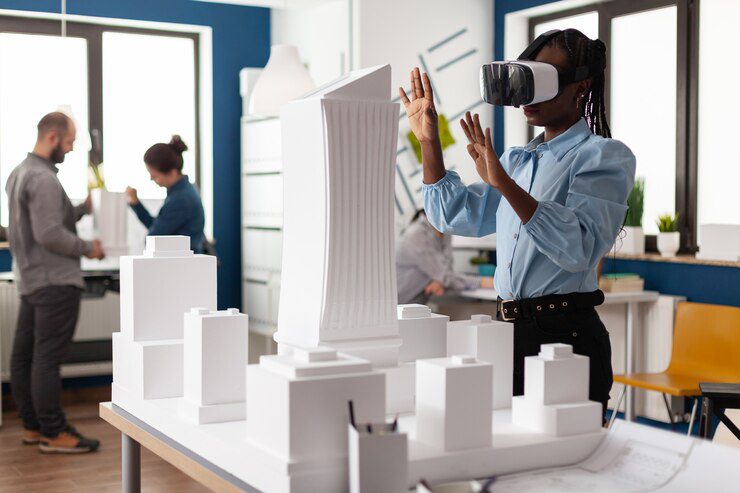Virtual reality (VR) is stepping out of the realm of games and entertainment as a shaper across industries. Virtual reality innovations are experiencing a rapid uptake as many organizations harness the power of this technology to change working, learning, promotions, and many more. In this blog, let us find out how this technology is disrupting various industries and why this can be considered one of the trends for the future.
Healthcare: Training & Treatment
Healthcare professionals have not taken their time to adopt virtual reality advancements. It has now become possible to train surgeons through VR, practice different intricate operations, and allow mastering in surgery without high stakes, which are connected with real operations. Being able to experiment does prevent mistakes, and Harvard Business Review discovered that VR-trained surgeons retained 6% fewer errors while learning. Also, VR therapy is applied to such diseases as PTSD, anxiety, and phobia, as the patient can face the phobia in guided exposure in a VR environment.
Retail: Improving the Shopping Trip
Grocers are using advanced virtual reality innovations to give consumers a chance to get a feel for the stores they shop at. It is now possible to virtually wear clothes or experience a showroom without physically moving from the house. A Statista survey revealed that as many as 63% of consumers think that, shortly, VR will greatly transform their shopping experience. Some companies, such as IKEA, have come up with VR apps that help users see the appearance of their furniture before they make the purchase.
Real Estate: Virtual Property Tours
The use of virtual reality in real estate business is also on the rise. It has become possible to avoid physical visits to the houses for sale or rent by using 360 tours and seeing the house from the comfort of one’s home. This virtual reality idea aids buyers in assessing several properties without physical moves, hence solving the puzzle of the time-consuming process of deciding on the choice of a property.
Education: Interactive Learning
Virtual reality innovations are fast revolutionizing the education sector since they provide students with an exciting experience. No longer are students limited to getting a passive view of history or science; to present them in their raw form is to let students live through it. For example, they can go through a virtual tour of Rome or make an interactive journey through human anatomy. Research also proves that the use of VR may increase knowledge retention by up to 75%, proving VR a strong medium for education.
Manufacturing & Engineering: Streamlining Processes
To the manufacturer and engineer, the benefits range from product design, product development, and learning through virtual reality. Based on the developments of virtual reality, they can model the production process, observe weaknesses, and make improvements before developing a tangible model. Not only does this accelerate the creation of new products, but costs are also cut in the process. According to a report from PwC, VR training simulations enhance an employee’s performance by 70% as a result of the training preparing a learner for real-life simulation.
Tourism: Traveling Without Moving
This technology is allowing individuals to virtual tour tourist destinations from the comfort of their homes. Some examples of travel technology innovations are immersive experiences like virtual cities, virtual guides, virtual landmarks, and hotel tours, which enable travelers to have a look at what is in store for them. This has become more evident and has developed when there are restraints put in place, like restrictions to travel because of diseases, among other things, so that it can get a people tour.
The Future of Virtual Reality Inventions
Virtual reality innovations are not something that has been taken up across different industries merely because it is the latest trend; it is the future of technology. Statista also pointed out that the VR market around the globe is expected to rise to $87 billion by 2030, which shows further potential of VR technology. As the development of virtual reality technology continues to progress, we predict that even more fields will embrace these advancements, making operations more effective, enhancing customer interactions, and improving training simulations.
Conclusion
Virtual reality innovations are transforming industries at an unprecedented pace, offering new ways to interact, learn, and experience the world around us. From healthcare and education to retail and tourism, VR is breaking boundaries and creating opportunities we never thought possible. As businesses continue to explore VR’s potential, it’s clear that this technology is not just a trend but a key driver of future growth and innovation. If you haven’t already, it’s time to embrace VR and see how it can transform your industry too.







